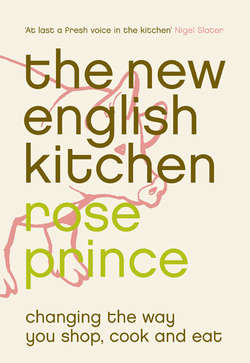Читать книгу The New English Kitchen: Changing the Way You Shop, Cook and Eat - Rose Prince - Страница 78
2 store
ОглавлениеA good cook knows how to squirrel food away, storing it to save not just time but money, too. Squirrelling reduces the number of occasions when you hear yourself say, ‘I haven’t the time to cook.’ It is also a comfort when you don’t want to shop. It’s not that taking an evening off cooking is a bad thing, but with the pressure upon everyone to work longer hours and spend more time on other pursuits, a night off cooking can turn into six nights. And unless you really hate cooking, it’s not just the cost that is irksome but the sensation that you are 100 per cent reliant on others to choose the food you eat.
A good store of food not only means more home cooking and therefore more pleasure, it makes good economic sense, rewarding you with more money to spend on other things.
A few organisational skills are needed. Briefly imagine living on a boat. The bulk of what you eat must come from packets, cans, or sacks kept in the dark to prevent the contents rotting. Before the days of fridge freezers, the ship’s cook must have been a man of talent, able not only to improvise with the few fresh ingredients available but – who knows? – perhaps also to prevent a crew going stir-crazy from meal tedium. Knowing how to use your stores is a good discipline. Even with the advantages of refrigerated storage, store food has changed little from centuries ago.
The miles of aisles devoted to bottled, canned, frozen and packet food are endless. Spoilt for choice, that’s us – yet look again and there are very few things that anyone really needs. Cooking sauce? Try a little oil, spice and lemon. Flavoured rice? Add dried wild mushrooms to ordinary rice. Ready-made vegetable curry? Heat canned tomatoes, coconut milk and spices with canned chick peas.
Food manufacturers are always keen to show journalists their latest innovations. Warrens of laboratories are devoted to the imaginings of their development teams. In the name of convenience, they bottle and preserve our favourite foods and create some weird new ones. My heart sinks when I see all this effort in pursuit of the impossible. Fresh pesto tickles every sense; bottled is, well, all right. Home-made tomato sauce is sweet, light and delicate; commercially bottled tomato sauce is salty and acidic, bulked out with thickeners to make money for the manufacturer. None of these is essential. Lazy cooks could save themselves the bother of carrying it all home if only they would shake a little good olive oil on to cooked pasta, chop a bit of chilli and mash a little garlic. This is olio d’aglio – the sauce to make when you come in at midnight, desperate not just for food but for real cooking.
The contents of my store cupboard are minimal. Actually, that’s not entirely true. The contents of my store cupboard are vast, but most of it is food bought that is never finished. No matter how clever the manufacturer, I don’t want their poppy seed, tarragon and lemon salad dressing – I want my bottle of olive oil and a lemon, and a little soft crystal sea salt. The contents of my store cupboard that I use are minimal. That is the truth.
This is about the sum of it. I could potentially survive on the following but the children would complain:
